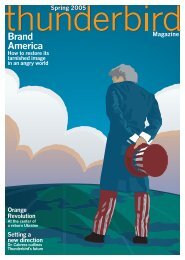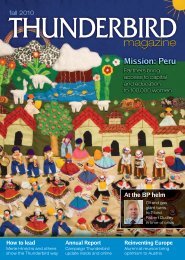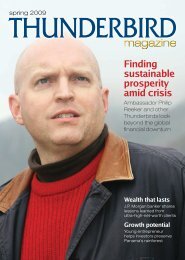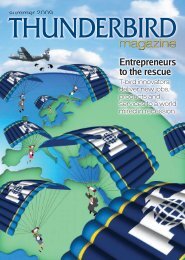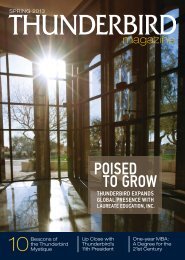Spring 11 MASTER.indd - Thunderbird Magazine
Spring 11 MASTER.indd - Thunderbird Magazine
Spring 11 MASTER.indd - Thunderbird Magazine
Create successful ePaper yourself
Turn your PDF publications into a flip-book with our unique Google optimized e-Paper software.
VOLUTION<br />
Decades before massive oil<br />
discovery, nation taps the<br />
power of sugarcane<br />
Story and photos by Daryl James<br />
An experimental<br />
sugarcane fi eld borders<br />
the Cane Technology<br />
Center in Piracicaba,<br />
about two hours north<br />
of São Paulo, Brazil.<br />
<strong>Thunderbird</strong> students<br />
visited the research center<br />
Jan. 13, 20<strong>11</strong>, to learn<br />
about efforts to develop<br />
new sugarcane varieties.<br />
Brazilians had a joke about their overreliance on foreign oil<br />
during the 1970s energy crisis. Venezuela and Argentina, their<br />
neighbors to the north and south, both had oil. Brazil just needed<br />
to find the elusive pipeline connecting the countries.<br />
“It was a joke for 30 years,” <strong>Thunderbird</strong> Professor John Zerio,<br />
Ph.D., tells his students in São Paulo on the opening day of a three-week<br />
Winterim course on sustainability. “But Brazil never found huge amounts<br />
of oil, and it was the best thing that ever happened.”<br />
Left with few options, the emerging market looked inward and found a<br />
sustainable energy source in the abundant sugarcane plantations that Portuguese<br />
settlers first commercialized in the 1500s.<br />
Decades before other countries started thinking about ethanol, Brazil<br />
launched a biofuel revolution using the power of sugarcane in ways the<br />
early colonists never imagined. The ethanol movement has taken hold since<br />
then like nowhere else on the planet.<br />
“Ethanol is embedded in the DNA of this country,” says Zerio, a Brazilian<br />
native from São Paulo. “People here are proud of their sugarcane and the<br />
sustainability it represents.”<br />
Nearly half of the Brazilian vehicles operating in 20<strong>11</strong> include flexible fuel<br />
engines optimized to run on 100 percent ethanol or any mix of gasoline.<br />
Every service station in the country sells domestic ethanol side-by-side with<br />
other fuels, and regular gasoline includes 25 percent ethanol.<br />
The programs have produced dramatic results. Brazil’s National Petroleum<br />
Agency estimates that the country’s ethanol consumption surpassed<br />
that of gasoline in the second half of 2008.<br />
Brazil also produces electricity and other products from sugarcane without<br />
jeopardizing the country’s status as the world’s No. 1 exporter of granulated<br />
sugar. The alternate energy source means Brazilians have options when<br />
oil prices surge — as they have in 20<strong>11</strong> — or when sugar prices fluctuate.<br />
Brazil carved out the energy niche without waiting for a pipeline discovery<br />
between Venezuela and Argentina. But the joke took a twist in 2007<br />
when Brazilian state oil company Petrobras announced a massive find off<br />
the coast of Rio de Janeiro that could turn the country into a major oil exporter<br />
within 10 years.<br />
thunderbird magazine 37




